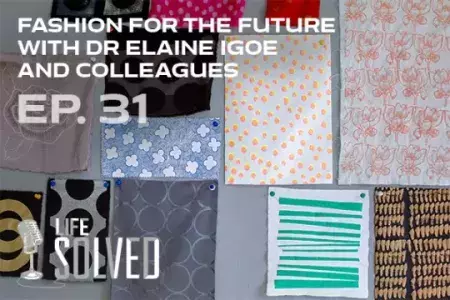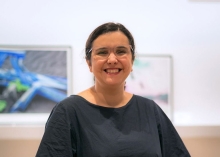
Research into fashion and textiles has an impact on everyone. Fabric and clothing are part of practically every moment of our lives – from what we wear, to the furnishings in our homes.
Our fashion, textiles and material futures research is addressing important issues around fashion and textile design and its associated industries.
We work to drive positive change and responsible approaches to designing fashion and textiles in the future. We support the Fashion Revolution campaign and its agenda for sustainability and ethics from industry and consumers.
We're exploring the design process and its outcomes, including work into the use of digital technologies within design and supply chains, theoretical research into design and craft that questions fashion and textile futures and socially engaged practices that educate and provide opportunities for economic growth.
Our research covers the following topics
- Sustainability and ethics in supply chains
- Socially engaged practices in making and education
- Digital and virtual technologies
- Critical practice and theories of craft and design
- Fashion and textiles education and pedagogy
Methods and facilities
Our researchers use practice-based approaches in their qualitative work. We seek to work collaboratively, often using varied approaches such as film-making, animation, narrative methods and workshops.
We have a range of facilities available to support this research practice including Lectra Modaris, laser cutting, 3D printing, CNC milling, rapid forming, as well as digital technologies for VR and AR applications.
Funders and collaborations
Our research receives funding from major funding organisations, including the British Council – who funded our Arts Exchange with Wuhan Textile University, China – and the Regional Development Agency.
We collaborate with academic partners beyond fashion and textiles across a range of fields, including international law, ethical business, social engagement, dance and performance, motion capture and digital and virtual animation. One of our researchers, Karen Ryan, also attended the PlasticsFuture 2023 conference, organised by Revolution Plastics, co-convening the 'Exploring the current issues of plastic use within the context of fashion and textiles and the role of plastics in the future’ session.
Research outputs
Our research is regularly exhibited and published in academic journals, books and at events and conferences internationally including the Venice Biennale, FAD Barcelona, Wuhan Fashion Week (China) and the Design Research Society International Conference.
We've also presented and exhibited our work around the world, such as the Venice Biennale, FAD Barcelona, the Design Research Society International Conference, and Wuhan Fashion Week, China.
Textile fenestra and spiracles: mattering the swatch
Igoe, E. (2022) "Textile fenestra and spiracles: mattering the swatch" In C. Sauer, M. Stoll, E. Fransén Waldhör, and M. Schneider (Eds.), Architectures of Weaving: From Fibers and Yarns to Scaffolds and Skins (pp. 181-187). Jovis Verlag.
Textile Design Theory in the Making
Igoe, E. (2021) "Textile Design Theory in the Making", Bloomsbury Publishing Company.
Commoning situated knowledge: co-teaching-and-learning the ‘design-led upcycling’ of waste clothing
Igoe, E., Noble, S., Mendonca Guterres Torres, L., and Cunningham, J. (2021) "Commoning situated knowledge: co-teaching-and-learning the ‘design-led upcycling’ of waste clothing" In K. Sung, J. Singh, and B. Bridgens (Eds.), State-of-the-Art Upcycling Research and Practice: Proceedings of the International Upcycling Symposium 2020 (pp. 79-85). (Lecture Notes in Production Engineering), Springer.
Fashion ontology: researching the possibilities for knowing through an expanded fashion practice
Mendonca Guterres Torres, L. (2022) "Fashion ontology: researching the possibilities for knowing through an expanded fashion practice" In E. Gaugele, and M. Titton (Eds.), Fashion Knowledge: Theories, Methods, Practices, and Politics Intellect Books.
Ryan, K. M. (2022) "Re-framing the arts dissertation: the visual research abstract as an alternative, innovative and creative approach to fashion research", International Journal of Fashion Design, Technology and Education, 15(3), 440-449.
Ryan, K. M. (2020) "Digital fashion – exploring the impact of an integrated graduate internship programme in higher education: a UK case study", International Journal of Fashion Design, Technology and Education, 13(3), 308-316.

Our members
Discover our areas of expertise
Fashion, textiles and material futures is one of 5 areas of expertise within our Art and Design: Practice, Theory and History – explore the other 4 below.
Graphic and communication design
Our research is looking at the history of design, and ethnographic studies in relation to design, design usability, legibility studies, design knowledge, and epistemology.

Illustration, Drawing, Artists Books and Zines
Our research explores how self-publishing can allow a more diverse range of authors to communicate with an audience and investigates authorial illustration as an emerging genre.

Photography
We're using the photographic image in its expanded field as an investigative tool. Our research explores photography as a medium, and investigates how photographic practices shape individual subjectivity and modernity.

Histories and Theories of Art, Design, Visual and Material Culture
Our research locates the historical and contemporary production and consumption of art, design, visual and material culture in wider social, cultural, political and economic contexts.

Interested in a PhD in Art and Design?
Browse our postgraduate research degrees – including PhDs and MPhils – at our Art and Design postgraduate research degrees page.


